The history of money
As I’ve left the academic ivory tower I’ve had to ask myself why the CEO is constantly pushing us towards higher targets in the next year? Why can’t we just create something useful for the user, get paid and call it a day?
This need for constant growth extends to all aspects of our lives. The news is constantly updating us on our GDP and productivity targets, podcasters are pushing for self-improvement and for some reason every product needs a new AI feature.
What is going on? Why are we all so obsessed with the future and the concept of progress?
Well, “to understand our century we need to comes to terms with at least two others”. Thankfully, many authors agree with this sentiment and have created an entire genre dedicated to this topic. Broadly pitched as a kind of “history of money”, these books take a quick canter through humanity’s past, cherry-picking stories to explain how we got to whatever it is we are doing in this decade.
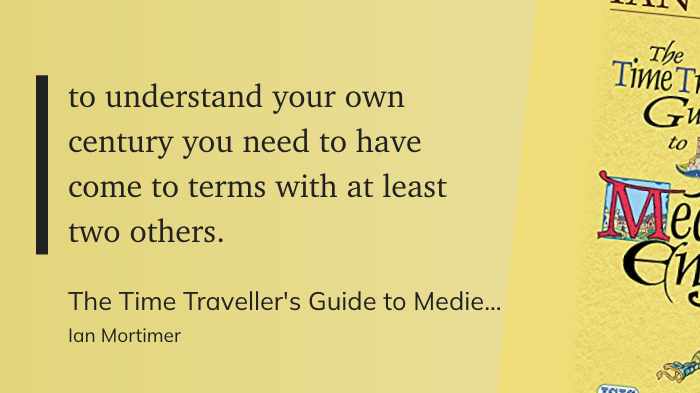
Although each book touches upon several of the same points in history, e.g. the invention of coins, banking, credit, Globalisation, they each weave together the threads in pleasing different ways. Contrary to what you might think, hearing the same stories over and over is actually quite refreshing. Your confidence grows with each read, allowing more pleasure to be found in the individual stories.
Over the past few years I have explored this genre. In this essay I hope to give you a sense of each book, and how they contributed to my own personal understanding, but please, whatever you do, don’t mistake the number books I have read with any expertise.
Sapiens
I happened to start on the book with the most ambitious scope. Sapiens, by Yuval Noah Harari, aims to tell the entire story of humanity in “pop-“ history, economics and anthropology book all rolled into one. For me, this book was able to explain and connect many “-isms” that I had of course heard of, but not truly appreciated. For example, here are two quotes explaining the difference in attitude between the middle ages:
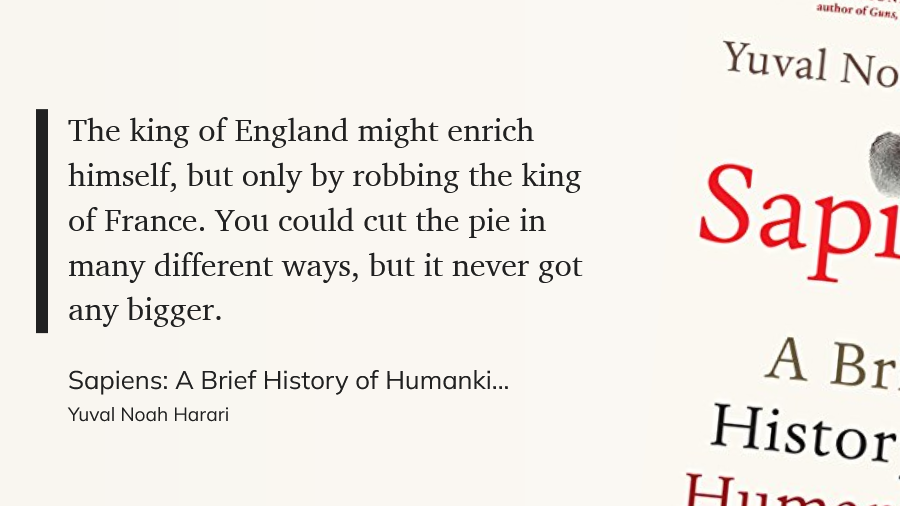
and the imperial age:
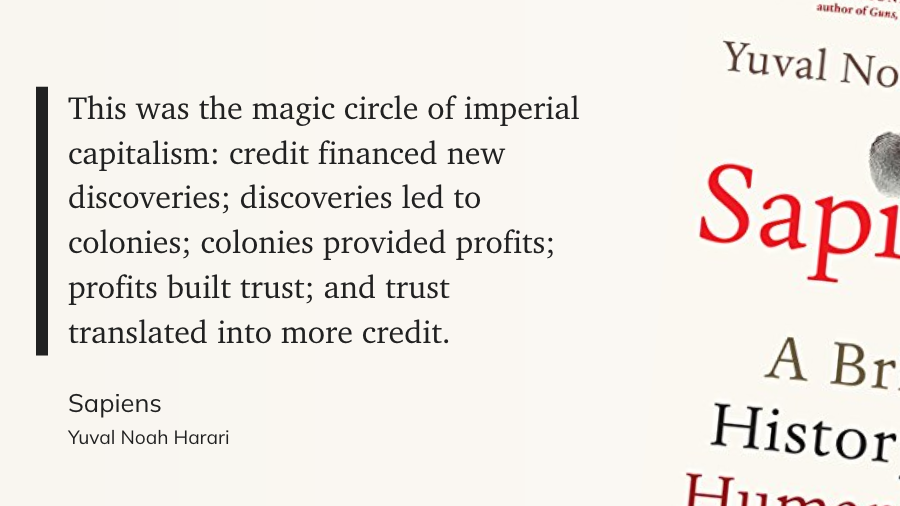
These stories have essentially introduced us to the difference between Mercantilism and Capitalism without having to wade through a sea of jargon. As with any popular non-fiction, this book glosses over a lot of nuance in favour of the overall narrative. This is perfect for new readers to this subject and I can give it no higher compliment than having created over 300 highlights on my Kindle.
Talking to My Daughter
Although Sapiens gave me a leg up to understanding the history of money, it is a hefty tome that would be hard to revisit every year. That is why “Talking to My Daughter” by Yanis Varoufakis, weighing in at just over 200 pages, has become a favourite of this genre. This condensed economic take on history has the literary device of a father, who happens to be a former professor in economics, attempting to explain capitalism to his daughter. The subject is sufficiently approachable, with references to cultural touch-points like Frankenstein and The Matrix. Yet the tone remains serious, reflecting the authors own battle with economics following the 2008 financial crisis.
The most illuminating example looks at how attitudes towards debt had shifted through the lens of the Doctor Faustus story. Literally making a deal with the devil, Faustus signs a contract to give up his soul in return for 24 years of power and bliss.
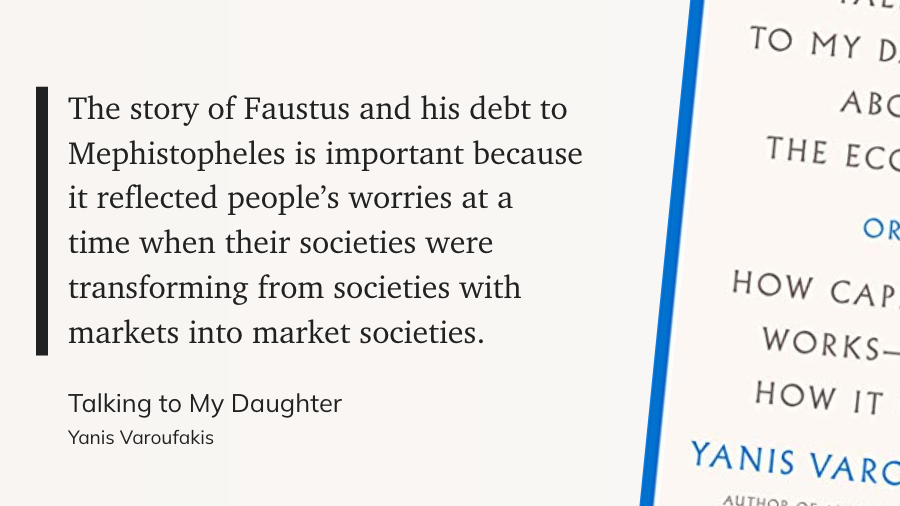
In the original 16th century telling, when Marlow penned the play, christianity viewed usury (paying interest on debt) as a sin. When it comes time for the devil to call in his loan, there is no happy ending, the audience expect the debt to be paid and for Faustus to be dragged to hell.
In contrast, by the time Goethe wrote his 19th century version, the audience had come to accept debt, and the interest paid on it, as part of “modern” life in the industrial revolution. Therefore, as the 24 years come to an end, Faustus attempts to pay back his debt through public acts of good that please God enough to send his angels to intervene and bring him to heaven singing “He who strives on and lives to strive can earn redemption still”.
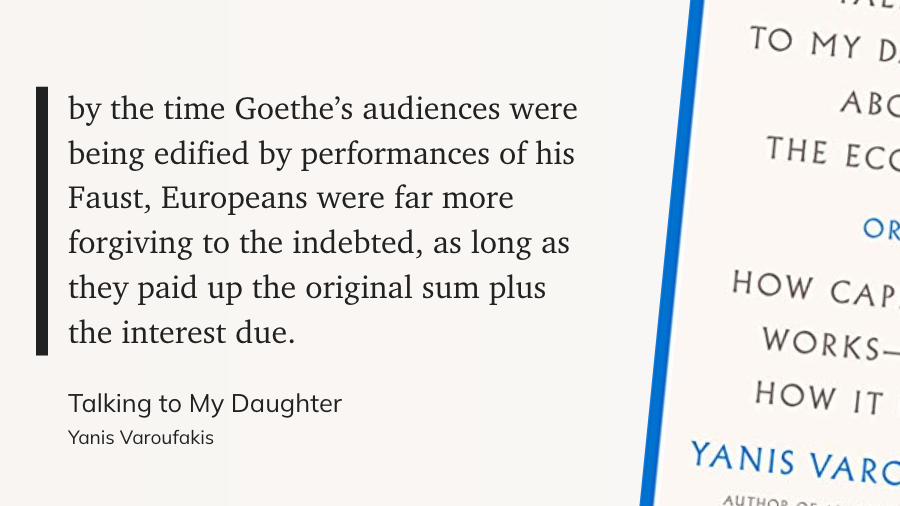
Varoufakis skillfully weaves this analysis into larger explanation of how humans shifted from “a society with markets, to a market society”. As with all good teachers, the author makes you feel like you could have figured this out by yourself, thereby inspiring you to critically examine our current world.
Well, much like Dr. Faustus, Homer Simpson also promises his soul to the devil in the Treehouse of Horrors IV, in exchange for the thing he desires most - a donut. We, the modern audience, share Gothe’s view that Homer should be spared from eternal damnation, but rather being saved by God, Homer has the legal system to thank. So, in just ten minutes of cartoon we have reflected our willingness to take on debt, but also reveals who we turn to when we cannot pay it back.
As a final endorsement, I enjoyed this book so much that I bought the Kindle as well just so I could highlight it properly.
Money
If “Talking to my daughter” is about big ideas and how culture reflects them, then “Money” by David McWilliams is the story of the individuals within each historical shift, and who they might represent today.
To you and me, the name Fibonacci evokes pure mathematics and Romanesco cauliflowers. In the 13th century, he began as more of a business influencer than a mathematical scholar. In his book “Liber Abaci”, Fibonacci pitched the idea of Arabic numerals and advised merchants on how to keep books, convert weights and measures and calculate interest without the aid of an abacus. This new technology became the biggest business trend of its day, with the city of Florence setting up special “reckoning” schools, or as McWilliams puts it, “the Harvard MBAs of the fourteenth century”. In our modern podcasting culture, I can’t imagine it would have been long for Fibonacci sat down with Steven Bartlett in an episode titled:
Why the Wrong Numbers Could Be Holding You Back – Fibonacci Explains Fibonacci shares how his time in North Africa exposed him to a superior way of handling numbers — one that would empower merchants, traders, and bankers to scale their businesses like never before.
While Fibonacci might make a perfect podcast guest, the same cannot be said for most of the financial innovators we are introduced to. By focussing on unsavoury characters like John Law and Gutenburg, the author reminds us that most financial progress is not achieved out of the goodness in people’s hearts. These historical swindlers weren’t motivated by advancing human knowledge, they just wanted to get rich. This humbling reminder, and witty prose, make a great complement to the grander “humanity is on a noble journey” message depicted in Sapiens. Being published much more recently, an added bonus of this book is an excellent chapter on crypto-currencies and the future of money.
The Psychology of Money
While not strictly from the same genre, “The Psychology of Money” by Morgan Housel provides the most practical and empathetic guide to money and investment. Having gone to Imperial College, I know a lot of people who devote their mathematical knowledge to making the absolute optimal investments. I feel the same urge. Surely I can come up with a little model to tell me how to invest for maximum gains?
But wait, is that really what I should optimise for?
This is the first book I’ve read that really examines this philosophical question. According to Housel, we would be much happier if we instead optimised for “sleeping well at night”, or for “financial freedom”. The author pairs this type of critical analysis with an array of anecdotes from recent history (20th century onwards). So, even though this book only covers living memory, it still has the same effect as the more historical books referenced above. We are reminded that a generation is an extremely long time in monetary terms. Grandparents will tell you to invest in premium bonds, because that’s what worked in their decade. Baby boomers will tell you to invest in the stock market, because they lived through the greatest period of economic expansion ever. To me, this book helps convert historical knowledge into practical advice and represents the final piece of the money story.
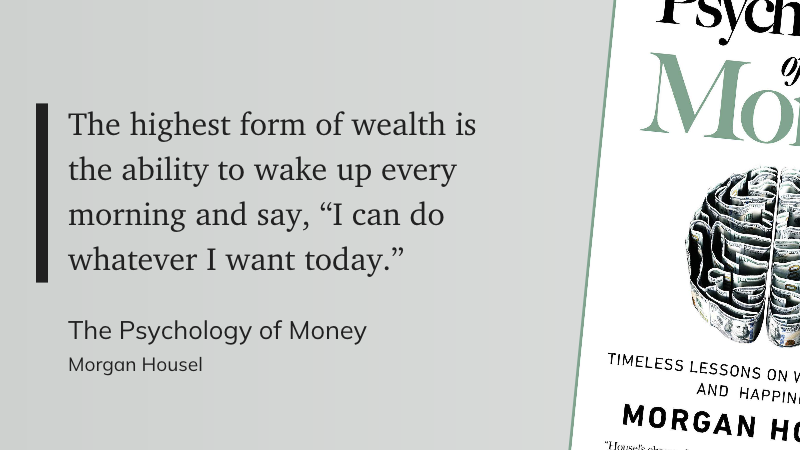
Conclusion
So has all this information actually sunk in? Well, I do feel I can give a tentative answer to the question posed at the start of this essay: “why do we care about the future?”.
The answer is… because we have to. Our whole society is bet on things improving in the future: productivity will increase, those debts will be paid and the investment cycle will continue. This has bled through into our attitude to life, social stigmas will relax, we will solve this next crisis. Maybe the cracks are starting to show with movements like Brexit and Trump, but I will leave that for a future history book.
Honourable Mentions
- “Unruly” by David Mitchell, helps understand the mindset of medieval Kings and denizens. For hundreds of years, people of the past would harken back to some “golden age” when everything was better, rather than looking forward.
- “The Trading Game” by Gary Stevenson is an excellent financial thriller, showing you the inside workings of an FX trader at Citibank following the financial crisis
- Johnny Harris is a great visual story teller, but the comment section gets a bit angry with his creative license.
- CGP Grey explaining how Europeans conquered the New world and why there was no Americapox